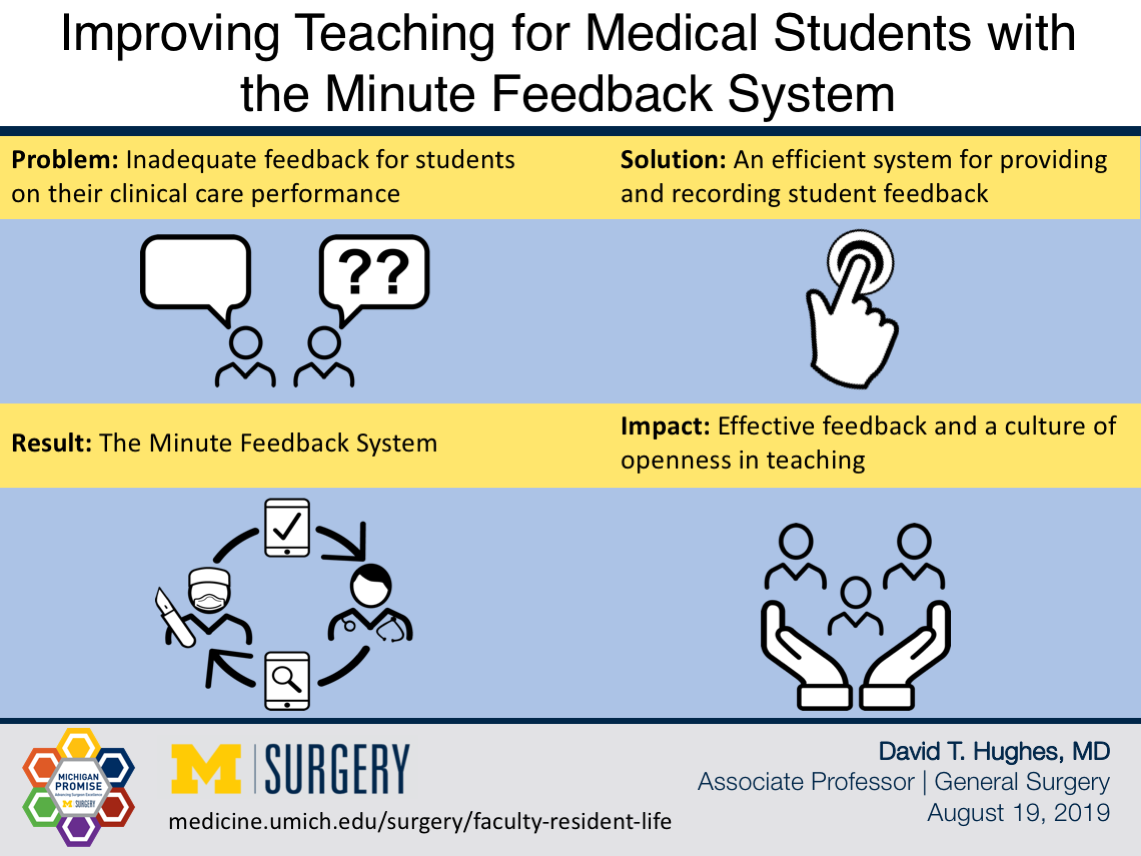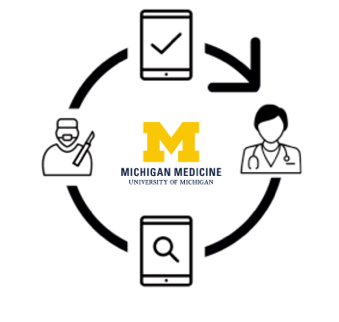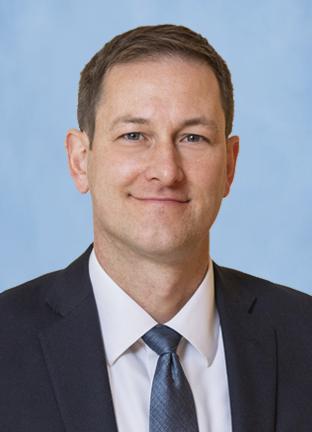

Surgery Clerkship Feedback
Becoming a physician requires a long and sometimes arduous educational journey through medical school, residency and fellowship training before one is ready for independent practice. Medical school has traditionally included two years of classroom teaching followed by two years of clinical training where students learn how to care for patients by observing, becoming part of the health care team and performing clinical care under the supervision of faculty and residents. This learn by doing approach to medical education means that the teaching of our future doctors relies almost exclusively on the feedback that supervising residents and faculty physicians give to students after observing their interactions with patients. The problem is that students routinely state that they do not receive adequate amounts of feedback about their performance of clinical care. This problem was especially present for our surgery clerkship students back in 2015 and nearly 40% of students said they were not provided adequate feedback at the end of their surgery rotation. Our students ranked us last of all the 3rd year clerkships in providing them adequate feedback and we had to fix this.
On the surface the solution seemed easy, just tell the residents and faculty to provide more feedback to students during their clerkship. However, the barriers for adequate feedback are many and include the need to provide care for patients at the same time as teaching, the time constraints of a busy clinical service, the sometimes small amount of time students spend with individual faculty, and the lack of recognition that students sometimes have when they do receive feedback. We needed a way to provide frequent feedback to students about their clinical care skills without it being too onerous for the residents and faculty and we needed a way to track that feedback to review with students at the end of their rotation.
The Minute Feedback System

So we created the Minute Feedback System. The concept is simple: allow students to send an electronic request for feedback to the resident and faculty they worked with at the end of every day; the faculty or resident immediately receives this request and provides specific feedback to the student about their performance of clinic care in a brief, less than 1-minute response; the student then immediately receives the feedback for review. The Minute Feedback System also stores each feedback interaction between students and residents or faculty and this database allows for tracking of engagement of all participants, it can be used to give students summative feedback trends about their performance in a longitudinal fashion, and it allows for a unique opportunity to perform educational research about how feedback is used in medical education.1-4
Since its creation in 2015, the system has been used over 10,000 times by hundreds of medical students, residents and faculty. It also helped solve our problem in the surgery clerkship and now, in the end of rotation evaluations, our students rank the surgery clerkship the best in providing them adequate amounts of feedback during their rotation.
With the success of the Minute Feedback System in the Department of Surgery the Medical School has plans to adopt it for use on all the clerkships. Additionally, after presentations of our research on a national stage interest in the feedback system has spread to other medical schools throughout the country, and we are currently developing a sharable Minute Feedback System for use throughout the country.
Ultimately the feedback system has done more than just provide snippets of feedback to our students, it has help to create a culture of openness in teaching. It has helped students to feel empowered to ask faculty how they can improve, and it has helped teach our residents and faculty how to provide specific, effective and frequent feedback to our students. All of these things share a common goal, to help our Michigan Medical Students be the best doctors they can be for all of their future patients.
References
- Hughes DT, Leininger L, Reddy RM, Sandhu G, Ryszawa S, Englesbe M. A novel Minute Feedback System for medical students. Am J Surg. 2017 Feb;213(2):330-335.
- Shaughness G, Georgoff PE, Sandhu G, Leininger L, Nikolian VC, Reddy R, Hughes DT. Assessment of clinical feedback given to medical students via an electronic feedback system. J Surg Res. 2017 Oct;218:174-179.
- Georgoff PE, Shaughness G, Leininger L, Nikolian VC, Sandhu G, Reddy R, Hughes DT. Evaluating the performance of the Minute Feedback System: A web-based feedback tool for medical students. Am J Surg. 2018 Feb;215(2):293-297.
- Barrett M, Georgoff P, Matusko N, Leininger L, Reddy RM, Sandhu G, Hughes DT. The Effects of Feedback Fatigue and Sex Disparities in Medical Student Feedback Assessed Using a Minute Feedback System. J Surg Educ. 2018 Sep - Oct;75(5):1245-1249.
Article by David Hughes, MD (Twitter: @hughesd623)
Downloads

David T. Hughes, MD, FACS
Contact Us
Reach out to join the conversation or to learn more about how to implement the Michigan Promise. Connect with the Department of Surgery or our faculty on Twitter to share your ideas or get in touch with the Office of Faculty & Resident Life to schedule a Michigan Promise presentation at your institution. You can also fill out our Michigan Promise Inquiry Form with any questions or comments.
Department of Surgery Office of Faculty & Resident Life
2210F Taubman Center
1500 E. Medical Center Dr.
Ann Arbor, MI 48109
Phone: 734-232-5528
Email: [email protected]
Twitter: @UMichSurgery
Hashtag: #MichiganPromise
